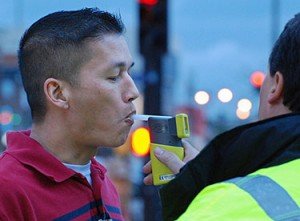DUI with BAC (blood alcohol content) .08 or higher
Under California Vehicle Code 23152(b) VC, driving with a BAC of 0.08 or higher is criminal offense on its own, regardless of whether the motorist was actually too drunk to drive or not.

It is important to understand that an individual is guilty of 23152(b) VC only if they had a BAC of at 0.08 or higher at the time they were driving, not before or after. One possible defense strategy is challenging the BAC evidence based on the time elapsed between when a driver was pulled over and when blood was drawn for testing.
California Vehicle Code 23152 and its subsections defines the crime of DUI in the state of California. The first two subsections of the statute are:
- 23152(a) VC, driving under the influence of alcohol.
- 23152(b) VC, driving with a blood alcohol concentration (BAC) of 0.08 or higher.
23152(a) is considered a subjective statute, in that a conviction does not require objective evidence such as blood testing. A conviction under subsection (a) will typically hinge upon the testimony of the arresting officer, and their observations about the motorist’s driving and behavior during the traffic stop and field sobriety tests, if any.
23152(b) is California’s “per se” DUI law that makes it unlawful to drive with a BAC of 0.08 or higher. “Per se” is a Latin term which means “by itself”. In other words, driving with a BAC of 0.08 or higher is criminal offense on its own, regardless of whether the motorist was actually too drunk to drive or not.
Elements of an offense under 23152(b) VC
In order to obtain a conviction, the prosecution must prove the following elements beyond a reasonable doubt:
- The defendant operated a motor vehicle.
- The defendant had a BAC of 0.08 or higher while operating the vehicle.
While the first element may seem obvious, it is not always a simple matter. For example, individuals have been arrested for DUI while sitting in a parked car, while sleeping in their vehicle, or following an accident. If the prosecution proves that the defendant moved the vehicle any distance while they were intoxicated – even if the arresting officer did not observe the vehicle being moved – the first element can be satisfied.
As for the second element, an individual is guilty of 23152(b) VC only if they had a BAC of at 0.08 or higher at the time they were driving, not before or after. For example, a driver might be involved in an accident, exchange insurance information, and then go home and start drinking. If police arrive later to discuss the accident, observe that the subject appears to be intoxicated, and conduct a BAC test that registers above 0.08, the motorist could potentially be charged with a violation of 23152(b). But at trial, the defense would challenge the BAC evidence based on the time elapsed between the accident and when the blood test was conducted, likely resulting in a verdict of not guilty.
Automatic driver’s license suspension
When a motorist is arrested for DUI in California, their driver’s license is automatically suspended by the Department of Motor Vehicles 30 days after their arrest — even if the DUI case has not yet gone to trial. This suspension can be put on hold pending a DMV hearing. The hearing is an opportunity for the motorist or their attorney to fight the license suspension. But a hearing request must be filed within 10 calendar days of the arrest date, or the accused waives their right to a hearing.
Criminal penalties for DUI
Criminal penalties vary depending upon the circumstances of the case, whether the offense is a misdemeanor or felony, and any prior history of DUI convictions. Most first, second, and third DUI convictions are charged as misdemeanors. DUI is a felony when the defendant has three or more prior DUI (or equivalent) convictions, or in some cases when the DUI causes an injury. Click here for more information about California DUI penalties.
Legal defenses
Only a qualified attorney can provide accurate legal advice to someone charged with DUI. Because a DUI conviction carries potentially severe penalties — including automatic suspension of the driver’s license starting 30 days after the arrest — anyone charged with DUI should immediately seek representation by an attorney.
There are a variety of legal defenses to 23152(b), including:
- The defendant’s BAC was actually below 0.08 at the time they were driving.
- A tainted breath sample, due to the presence of mouth alcohol, regurgitation/GERD, belching, medication containing alcohol, mouthwash, diabetes, hypoglycemia, or dental work, which caused the defendant to blow a higher BAC than was true and accurate.
- An improperly obtained, collected, and/or stored breath, blood, or urine sample, or issues with the chain of custody of any evidence.
- A faulty, poorly maintained, or improperly calibrated breathalyzer or other testing device that does not adhere to Title 17 of the California Code of Regulations.
Of particular note is that in some cases, the defendant’s BAC may have been “on the rise.” This means alcohol was still being absorbed into the bloodstream between the time of the traffic stop and the time the BAC test was conducted. If a defendant blows higher than a 0.08, their BAC may have actually been lower (and under the legal limit) when they were driving. In such cases, a forensic toxicologist testifying as an expert witness can introduce calculations of the defendant’s likely BAC at the moment they were driving, and could potentially influence the jury to deliver a verdict of not guilty.










